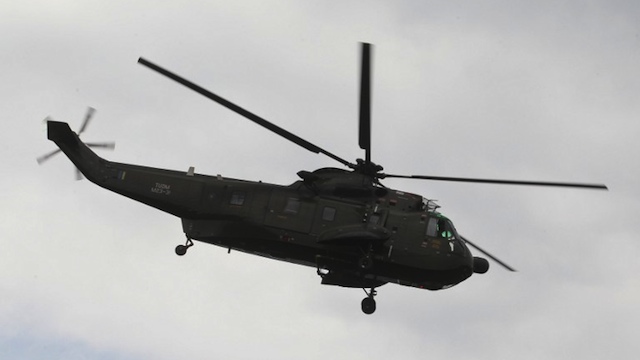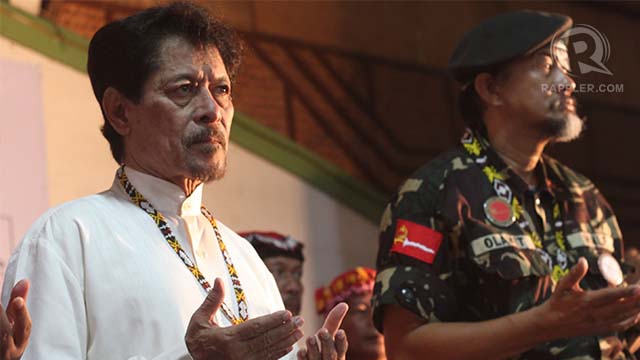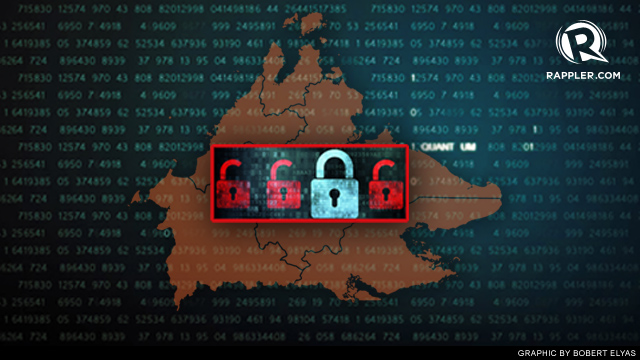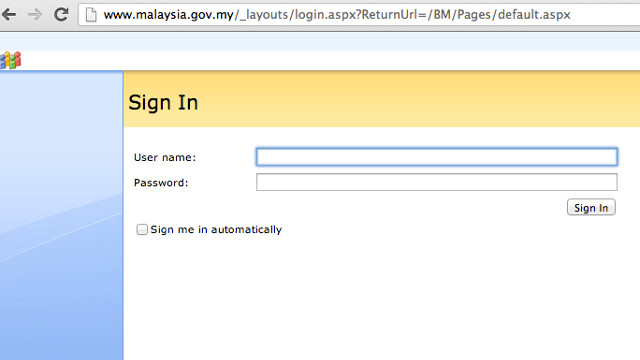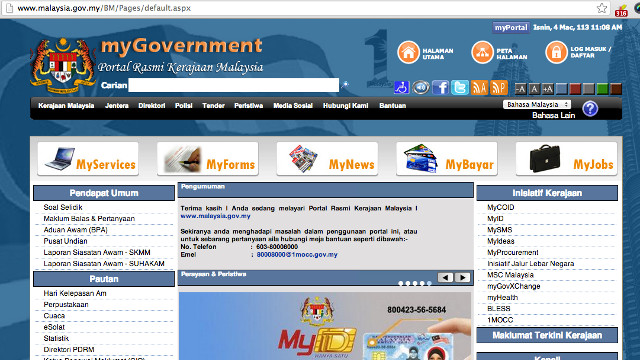From the Business Mirror (Mar 4):
Palace gives Malaysia free hand in Sabah row, links GMA to siege
Malacañang won’t call on Malaysian authorities to stop the ongoing military operations against remnants of some 200 followers of Sulu Sultan Jamalul Kiram III who survived the reported Sabah slaughter at Lahad Datu town in North Borneo last week, despite pleas to resume talks with Kiram’s group to avoid further bloodshed.
At the same time, it linked former President Gloria Macapagal-Arroyo to the Sabah case, saying the sultan could not have rallied his followers to invade Sabah without external support from a third party.
President Aquino dismissed as “alarmist” reports that Kuala Lumpur was also waging a simultaneous crackdown on Filipinos working in Malaysia. “Hindi ganun ang nangyari [That was not what happened],” he said, adding that he talked with Malaysian Prime Minister Najib Razak on Saturday and precisely appealed that the 800,000 Filipino workers be spared.
The President told reporters at a news conference at the Palace on Monday that “cases [based on intelligence reports] are being prepared” by the government against still-unnamed suspects reported to be involved in financing the trip of Kiram’s followers to Lahad Datu that ended in the bloody Sabah standoff last week.
He said that on the basis of evidence that will stand in court, charges will be filed against these suspects belonging to “private armed groups” that, according to him, operate “in connivance” with the immediate past administration of now lawmaker Arroyo.
“We are aware that there are those who conspired to bring us to this situation, a situation that has no immediate solutions. Some of their identities are clear to us, while others continue to skulk in the shadows,” Mr. Aquino added.
He pointed out that the family of the sultan “could not possibly have settled on this course of action alone.”
The President warned, “All those who have wronged our country will be held accountable.”
Earlier, Deputy Spokesman Abigail Valte told Palace reporters in a briefing also on Monday that the government was “leaving up to Malaysia” any decision to continue going after Kiram’s followers still holed out in Lahad Datu.
She debunked speculations that the Aquino administration was “lawyering for the Malaysians” instead of helping the Kirams pursue their ancestral and proprietary claim to Sabah that Kuala Lumpur has been leasing from the Sultanate of Sulu, paying rent amounting to about P70,000 a year.
To help neutralize armed Filipino intruders who have killed eight police officers in Malaysia’s bloodiest security emergency in years, Kuala Lumpur sent hundreds of soldiers to Sabah also on Monday.
Nineteen Filipino gunmen have also been slain since Friday in skirmishes that shocked Malaysians unaccustomed to such violence in their country, which borders insurgency-plagued southern provinces in the Philippines and Thailand.
The main group of intruders comprises nearly 200 members of a Philippine Muslim clan, some bearing rifles, who slipped past naval patrols last month, landed at a remote Malaysian coastal village in eastern Sabah state’s Lahad Datu district and insisted the territory was theirs.
Public attention focused also on Monday on how to minimize casualties while apprehending the trespassers, who are surrounded by security forces as well as an undetermined number of other armed Filipinos suspected to have encroached on two other districts within 300 kilometers (200 miles) of Lahad Datu.
Army reinforcements from other states in Malaysia were being deployed to Sabah and would help police
bolster public confidence by patroling various parts of the state’s eastern seaboard, Sabah police chief Hamza Taib said.
“The situation is under control now,” Hamza added. “There will be cooperation” between the military and the police.
He declined to elaborate on specific strategies or on a call by former Prime Minister Mahathir Mohamad for lethal action.
“There is no way out other than launching a counterattack to eliminate” the intruders, Malaysia’s national news agency Bernama quoted Mahathir as saying on Sunday. “Although many of them will be killed, this cannot be avoided because they had attacked Sabah, and not the other way around.”
Malaysia’s current leader, Prime Minister Najib Razak, declared over the weekend that security forces were authorized to “take any action deemed necessary.”
Some activists say the crisis illustrates an urgent need to review border security and immigration policies for Sabah, where hundreds of thousands of Filipinos have headed in recent decades—many of them illegally—to seek work and stability.
Groups of Filipino militants have occasionally also crossed into Sabah to stage kidnappings, including one that involved island resort vacationers in 2000. Malaysia has repeatedly intensified patrols, but the long and porous sea border with the Philippines remains difficult to guard.
Some in Muslim-majority Malaysia advocated patience in handling the Lahad Datu intruders who arrived on February 9. But the deaths of the Malaysian police officers, including six who were ambushed while inspecting a waterfront village in a separate Sabah district on Saturday, have triggered widespread alarm over the possibility of more such intrusions and demands for a swift resolution.
The Filipinos who landed in Lahad Datu, a short boat ride from the southern Philippine island of Mindanao, have rebuffed calls for them to leave, saying ownership documents from the late 1800s prove the territory is theirs. The group is led by a brother of Sultan Jamalul Kiram III of Sulu province in Mindanao, while the identities of other suspected Filipino intruders whose presence became known in two more Sabah districts over the weekend are unclear.
Edwin Lacierda, spokesman for President Aquino, reiterated calls in Manila for followers of the Kiram clan to surrender and return home, saying the Philippine government would then look into their property claim to Sabah.
“We continue to ask them that life is a better option than death,” Lacierda told ABS-CBN TV. “These casualties, the wounded, the fatalities, are all the product of what we have been trying to avoid, the bloodshed.”
The Philippine government is continuing to exert pressure on the clan to peacefully end the standoff and is also concerned about the safety of 800,000 Filipinos living and working in Sabah, the spokesman said.
The crisis could have wide-ranging political ramifications in both countries. Some fear that it might undermine peace talks brokered by Malaysia between Manila and the Moro Islamic Liberation Front, the main Muslim rebel group in southern Philippines.
It also could jeopardize public confidence in Malaysia’s long-ruling National Front coalition, which is gearing up for general elections that must be held by the end of June. The coalition requires strong support from voters in Sabah to fend off an opposition alliance that hopes to end more than five decades of federal rule by the National Front.
To prevent any more supposed intruders from beefing up the sultan’s followers in Sabah, Defense Secretary Voltaire T. Gazmin said also on Monday that they have deployed 10 ships to Lahad Datu.
“We’re thinking maybe the followers of Sultan Kiram are sending reinforcements,” he explained.
The government has also deployed BRP Tagbanua (AT-296), a transport ship that is awaiting permission from Malaysian authorities to dock at Lahad Datu and start repatriation of Filipino citizens interested to return to the Philippines.
The ship, which can carry 150-200 people, has on board medical and social welfare personnel, emergency supplies and food, all of which would be used for an evacuation.
Foreign Secretary Albert del Rosario was scheduled to leave for Kuala Lumpur also on Monday to convey the Philippine request for Malaysian authorities for a full briefing of the situation in Sabah.
